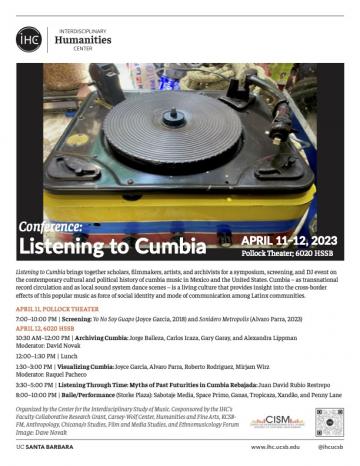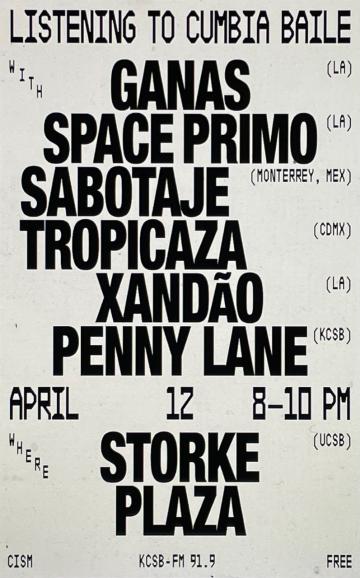Event Date:
Listening to Cumbia gathers speakers, filmmakers and performers to present research on cumbia in Mexico, the United States, and beyond, focusing on the material archives of cumbia in informal collections and media representations, as well as in sonidero (DJ) performances at bailes (dances). Both of these contexts - the transnational record circulation and the local dance scenes in Mexico and the United States – are living cultures that provide insight into the cross-border effects of sound media and the broad effects of popular music as a force of social identity among Latinx communities. The symposium the first of its kind focused on cumbia as a transnational media project, incorporating roundtable discussions and panels with a film screening, an on-site archival exhibition, and a cumbia sonidero DJ performance.
SCHEDULE
April 11: Screening
7-10 PM Pollock Theater
The symposium opens with a public screening of two documentary films on cumbia sonidera in Mexico City and Los Angeles, Joyce García’s Yo No Soy Guapo (2018) and premiere of Alvaro Parra’s “Sonidero Metropolis.” The films will be followed by a discussion and Q&A with Garcia and Parra, mediated by Professor Alexandra Lippman (Pomona College).
Yo No Soy Guapo (2018, 81 minutes) is a heartfelt and authentic portrait of Tepito, one of Mexico City's proudest barrios and the lengths to which they will go to defend their traditions. Garcia focuses on cumbia sonidera (sound system cumbia), a record-based dance music scene performed in the street on locally-made sound systems. As the city begins to gentrify, prohibitions on street dances by local government threaten to shut down parties and public gatherings. This is the U.S. premiere of Veracruz-based filmmaker Joyce García’s debut feature length documentary film. Yo No Soy Guapo was awarded the Incentive Program for Cinematographic Creators of the Mexican Institute of Cinematography in the “project development” modality in 2015 and won first place in the Guanajuato’s International Film Festival.
Sonidero Metropolis (2023, 22 minutes) is the first episode in Alvaro Parra’s documentary series about Mexican sound system culture, also known as Sonideros. The Los Angeles episode explores the connection between the cumbia epicenter that is Puebla, Mexico and Los Angeles, California, a city where thousands of Poblanos now reside. Antonio De Jesus, better known as Sonido Fantasma, has been a working sonidero for 31 years. A consummate veteran at the top of his game, he often plays in cities across the U.S. and Mexico, a rare feat in this industry. 17 year old Gardena resident Abimael Amaro, aka Sonido Profeta, played his first show at L.A's Salon Lazaro's at the age of 13. Sonido Profeta is part of a new generation of sonideros that utilize live stream technology to make a name for themselves in the U.S. and abroad. Sonido Fantasma and Sonido Profeta are both from Puebla, Mexico. This film depicts themes of migration, cumbia music, and labor, examined via the lives of two sonideros at opposite ends of their trajectories.
April 12: Symposium
IHC McCune Conference Room 6020 HSSB
10:00 AM: Gathering and Greetings
10:30 -12:00 AM: Archiving Cumbia: Jorge Balleza, Carlos Icaza, Gary Garay, and Alexandra Lippman
Moderator: David Novak (UCSB Music)
This roundtable discussion presents sonideros as archivists and knowledge producers and features a conversation between Jorge Balleza, Carlos Icaza, Gary Garay and Alexandra Lippman on caring for, curating, making public, and performing these archives.
Jorge Balleza is the director of the Cumbia Documentation Center and Archivo Dueñez, which aims to digitize and share on social media platforms Sonido Dueñez’s archive of photographs, cassette rebajada compilations, and records over the last fifty years. Sonido Dueñez is the creator of cumbia rebajada, an experimental, tape-based music from the working-class barrios of Monterrey. The projects highlight classic records, labels, rarities and art that accompanies the sound, and fill out the archive with interviews and anecdotes from the sonidero cultural scene.
Gary Garay will discuss how digging for cumbia records and ephemera informs his art practice and how he activates and makes public archives through performance at Más Exitos, his monthly radio show and DJ salon/dance party.
Carlos Icaza (Tropicaza) will talk about his collaborations with sonideros through record collecting, DJing, and radio. In collaboration with Wirz, Icaza conducted research for and interviewed sonideros and record collectors throughout Mexico for Ojos Suaves, a book of interviews, photographs, and ephemera following one record dealer, Morelos, who has traveled throughout South and Central America since the 1980s to buy records for sonideros located all over Mexico.
Alexandra Lippman will present a rough-cut of “Digging Cumbia,” a short documentary co-directed with David Novak, and discuss how Discos Rolas (the record label which she and Garay run) provides ways to engage with cumbia sonidera in highly collaborative, materially ways that are grounded in their practices as an artist and anthropologist.
12:00 - 1:30 PM Lunch
1:30 - 3:00 PM Visualizing Cumbia: Joyce García, Alvaro Parra, Roberto Rodriguez, Mirjam Wirz
Moderator: Raquel Pacheco (UCSB Anthropology)
This roundtable discusses cumbia as a visual culture and features a conversation between film directors Joyce García and Alvaro Parra, designer Roberto Rodriguez, and photographer Mirjam Wirzon documenting cumbia through film, photography, design, and book publishing.
Joyce Garcia and Alvaro Parra will discuss the process of creating documentary films with cumbia communities in Mexico City and Los Angeles, Roberto Rodriguez will discuss the visual representation of cumbia in poster art, photographs, flyers, recordings, and other soursces, and Mirjam Wirz will discuss Sonidero City, a multi-publication project she began in 2010 as a photographic research project about cumbia record collectors, collections of media and ephemera, and sound systems in Mexico and Colombia.
3:30 - 5:00 PM Keynote Lecture, Listening through Time: Myths of Past Futurities in Cumbia Rebajada: Juan David Rubio Restrepo (University of Texas El Paso)
Cumbia rebajada is a regiomontana (from Monterrey, México) expression of cumbia’s Pan-American polysemicity. (To) Rebajar—slowing down cumbia songs through electronic means—produces a lower-pitched track wherein original and copy, performer and sonidero, composition and reproduction enter into conflicting ontological relations. In rebajadas, these categories, as adjacent pitches, cancel each other. Underlining these overlapping dynamics is the rebajada’s aurality, contracting and expanding time. This talk considers cumbia rebajada through ethnography, film, and recordings and, mixing the actual with the fictive and the fantastical, hears echoes of past futurities where alterity, struggle, spaces, and temporalities conflate, giving way to the mythical. Listening through rebajadas’ groove, I take a non-linear and speculative approach to thread its paths, hi/stories, and subjectivities.
Juan David Rubio Restrepo is an artist/scholar and is currently Assistant Professor of Music and Chicano Studies at The University of Texas at El Paso. His creative practice and scholarly research consider different types of Latin American popular musics and global experimental practices. Juan David holds a Bachelor of Music in Jazz Studies and Drum Kit Performance from the Pontificia Universidad Javeriana (Bogotá, Colombia), a Master of Fine Arts in Integrated Composition, Improvisation, and Technology from the University of California, Irvine, and a Ph.D. in Music with a focus on Integrative Studies from the University of California, San Diego. An active drummer, composer, and music technologist, Juan David performs physically and telematically in venues worldwide. He writes in English and Spanish on music, alterity, sound technologies, and power.
8:00 - 10:00 PM Baile Closing Event (Storke Plaza)
Organized by the Center for the Interdisciplinary Study of Music. Co-sponsors: Carsey-Wolf Center, IHC’s Faculty Collaborative Research Grant, Humanities and Fine Arts, KCSB-FM, Department of Anthropology, Department of Chicana and Chicano Studies, Department of Film & Media Studies, and Department of Music.
Participants
Jorge G. Balleza is a photographer, archivist, and DJ born in Monterrey, Mexico, with roots in Sonora and Coahuila. Through installations, social media, ‘zines, and creative maps, Balleza curates living archives about Monterrey’s cumbia rebajada. He is a member of Sabotaje Media, a platform focused on narrating, navigating and mapping. They document the crossroads where politics, music and culture meet. They use audio-visual remixes as the primary tool in understanding our epoch. He created the Cumbia Documentation Center (CDC) and the Dueñez Archive as a way to document the creator of cumbia rebajada, Gabriel Dueñez’s through photographs and cassette compilations over the last fifty years. His solo exhibit at LaPau Gallery was reviewed by Hyperallergic.


